
MRSC, FHEA
Reader
- About
-
- Email Address
- w.houssen@abdn.ac.uk
- Telephone Number
- +44 (0)1224 437564
- Office Address
Room 6.36, Institute of Medical Sciences, University of Aberdeen, Aberdeen AB25 2ZD, UK
- School/Department
- School of Medicine, Medical Sciences and Nutrition
Biography
Dr Houssen obtained a BSc in Pharmaceutical Sciences (Very Good Honour) and an MSc in Pharmacognosy (from Mansoura University, Egypt, a PhD in organic chemistry from University of Aberdeen and a postgraduate certificate (with distinction) in protein crystallography from the University of London.
In 2006, he was appointed as a reserch fellow at University of Aberdeen then promoted to a research fellow Grade 7 (lecturer grade) in 2013 and to a senior research fellow Grade 8 (senior lecturer grade) in 2015. During his employment, he worked on different projects and gained multidisciplinary research experience in the fields of molecular biology, natural product chemistry, genome mining, synthetic biology, stem cells and electrophysiology.
He was awarded the 2001 Belgian Development Co-operation prize in recognition of his MSc research work which significantly contributed to the knowledge that can be applied to sustainable development efforts in developing countries. He is also the recipient of the competitive and prestigious 2013 SULSA Leaders award, a scheme which supports Scotland’s young scientists to become the next generation of leaders in academia or industry.
In 2019, Dr Houssen received a personal £1.3M fellowship award from EPSRC to establish his independent research group at University of Aberdeen.
External Memberships
- Member of the EPSRC Peer Review College.
- Member of the European Science Foundation (ESF) College of Expert Reviewers.
- Fellow of the Higher Education Academy (UK).
- Member of the Royal Society of Chemistry.
Prizes and Awards
- 2019 University of Aberdeen Principal’s Prize for Research and Engagement (Outstanding Research Team).
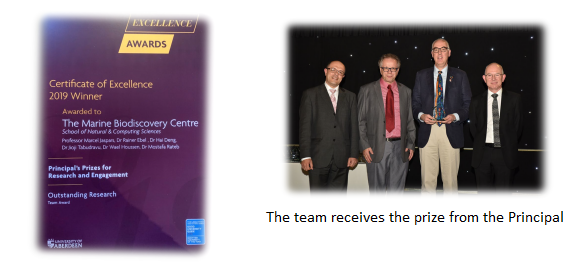
- 2000 Development Co-operation prize from the Royal Museum for Central Africa, Belgium (http://www.devcoprize.africamuseum.be/laureates/databank/2000).
- Research
-
Research Areas
Accepting PhDs
I am currently accepting PhDs in Chemistry, Biomedical Sciences.
Please get in touch if you would like to discuss your research ideas further.

Research Specialisms
- Biotechnology
- Biochemistry
- Molecular Biology
- Pharmaceutical Chemistry
- Medicinal Chemistry
Our research specialisms are based on the Higher Education Classification of Subjects (HECoS) which is HESA open data, published under the Creative Commons Attribution 4.0 International licence.
Current Research
The Grand Challenge: "Targeting the undruggable intractome"
My research tackles a challenge to drug discovery programmes and pharmaceutical industry which is centered around the difficulty in designing drugs that can disrupt intracellular protein-protein interactions (PPIs).
PPIs are known to be implicated in many complex diseases that are without as yet an effective treatment option such as cancer, psoriasis and many autoimmune disorders. PPIs are generally very challenging targets for small molecule drugs because these interactions take place over an extended binding surface and thus there is no well-defined binding pocket to help the design process. On the other hand, biological drugs such as antibodies can only disrupt extracellular PPIs, cannot be given orally and are very expensive.
There is a growing evidence that macrocyclic peptides can inhibit PPIs and are currently considered as "small biologics". However, their development as therapeutics is hampered by the challenges in their chemical synthesis at large scale and their poor cellular permeability. Modigfying cyclic peptides to enhance permeability is challenging and in many cases entails total re-synthesis which is costy and time consuming.
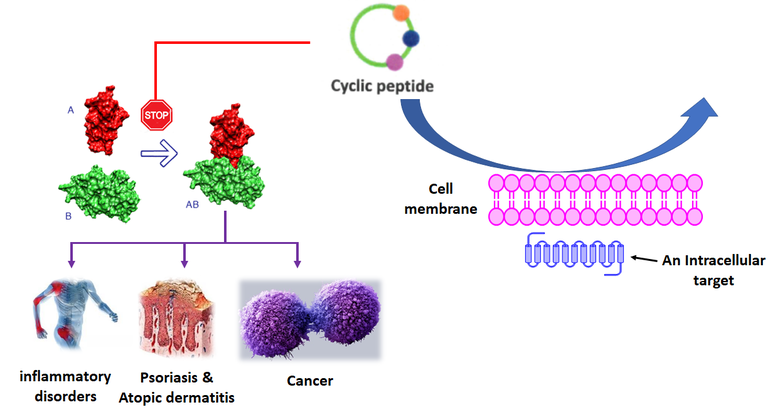
What do I do?
Recent advances in chemical biology allows us to undertand how natural cyclic peptides are produced inside the producing living organisms. I overexpress the biosynthetic enzymes involved and recruit them to produce bespoke modified macrocyclic peptides in the lab. These peptides are in silico designed to inhibit specific intracellular PPI. I then use variety of assays to test the affinity of these peptides to their targets and use the results to improve the design process.
I also use synthetic biology to develop an in vivo production system "cell factory" for these valuable drugs. The expertise established in the lab is multidisciplinary and involves elements of biochemistry, chemical biology, in silico drug design, peptide solid phase synthesis, genome mining and synthetic biology.
Why is this important?
My research bridges the worlds of peptide solid phase synthesis and synthetic biology and translates basic knowledge of unique enzymes to provide new products and less carbon intensive processes. The use of enzymes instead of toxic reagents in chemical synthesis is at the cutting edge of science and is environmentally friendly.
Lab Facilities
My Lab is very well-equipped for molecular biology (PCR, high pressure homogeniser, DNA and protein gel electrophoresis), peptide synthesis (automated microwave peptide synthesiser), chromatography (Agilent HPLC with DAD), Protein purification (two Biorad NGC medium-pressure liquid chromatography systems), microbial fermentation (autoclavable glass bioreactors and shaking and static incubators) and in silico drug design (different software packages).
Current Team Members
Alessandro Colombano, PhD

Alessandro joined my group as PDRA in February 2020 and his work in my lab is funded by EPSRC and aims to in silico design and synthesise modified cyclic peptide inhibitors for intracellular protein-protein interactions that is involved in cancer developement. Alessandro’s expertise includes synthetic organic chemistry, radiochemistry, PET imaging, drug design and solid-phase peptide synthesis.
In his free time, Alessandro enjoys playing the accordion, running, and combat flight simulation.
Claudia Clemente
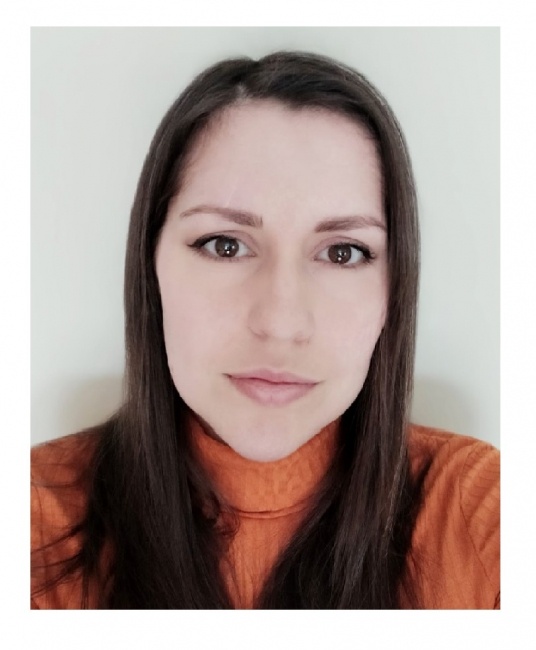
Claudia obtained a BSc in Biological Sciences from University of Bari Aldo Moro and an MSc in Cell Biology and Technologies from University of Rome 'La Sapienza'.
Claudia likes trekking, singing, drawing, writing and baking.
Nicholas Johnson

Nicholas is a british PhD student. His studentship is funded by IBioIC/ BBSRC CTP scheme. He is working toward developing enzymatic tools to incorporate heterocycles in peptides.
He obtained a MChem (Hons) in Chemistry from the University of Central Lancashire (Uclan) in 2020. During the course, he studied different subjects and topics but his favourite subject was natural product chemistry where he saw the potential of biologically made molecules. During the final year, he undertook a dissertation project entitled ‘Isolation and structure determination of compounds with anti-Alzheimer’s activity from the Fijian marine sponge, Geodia globostellifera, using advance chromatography, 1D, 2D NMR and HR-MS/MS techniques.’
Mohamed Nafie, PhD
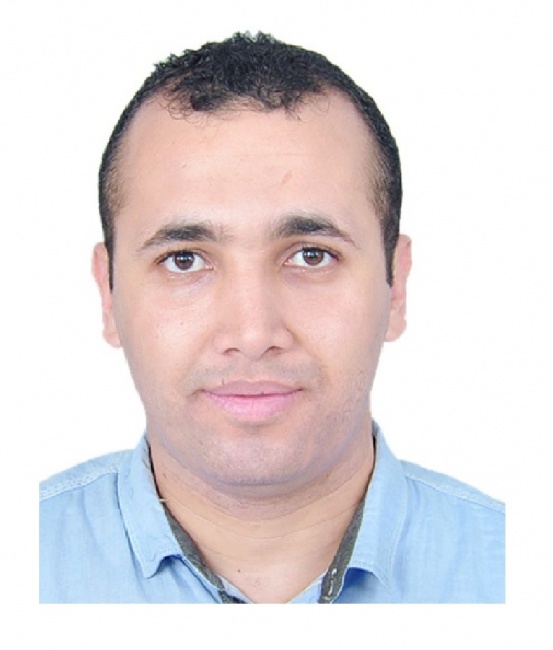
Mohamed obtained a BSc in Chemistry, MSc in Biochemistry and PhD in Biochemistry from Suez Canal University, Ismailia (Egypt). During his PhD, he spent 5 months training on CADD in the lab of Prof. Tiziano Ticcinardi, at University of Piza.
Mohamed enjoys infographic design and cooking.
Anna Müller
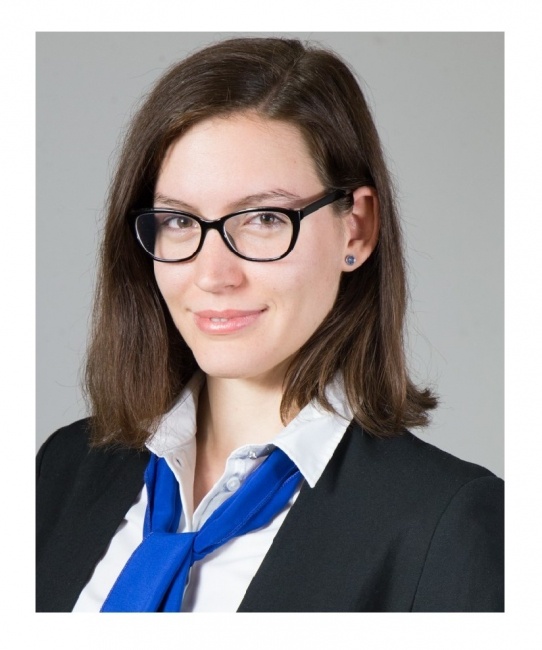
Anna is an MSc student in Biotechnology, Bioinformatics and Bio-Business at University of Aberdeen (2020). Her project is entitled "The use of deep genome mining to identify new peptide modifying enzymes from ribosomally encoded peptide pathways".
Anna obtained her BSc in Biochemical Engineering from Budapest University of Technology and Economics in 2019.
She likes spending time in nature and hiking
Engagement with policy makers and impact on policy
- I was invited by the United Nations Convention on Biological Diversity to conduct a study on the current use and application of digital sequence information on genetic resources in academia and industry, May 2019. This study is available at https://www.cbd.int/doc/c/fef9/2f90/70f037ccc5da885dfb293e88/dsi-ahteg-2020-01-03-en.pdf
- A policy brief based on the above study is available at https://www.dosi-project.org/wp-content/uploads/070-DSI-Policy-brief-V4-WEB.pdf
- I was invited to present my research work at the House of Commons as part of the 2018 STEM for Britain.
Supervision
My current supervision areas are: Chemistry, Biomedical Sciences.
PhD Students supervided to the completion of their degrees
Luca Dalponte

Main Supervisor: Wael Houssen
Co-supervisor(s): Marcel Jaspars
Funding: Industrial Biotechnology Innovation Centre (IBioIC).
After obtaining his PhD, Luca joined Scotia Biologics Ltd. in Aberdeen as a Senior Scientist responsible for the development and optimization of downstream processes delivering high quality and high purity biosimilars. Then he moved to England to take up a position of a research scientist at the multinational chemicals and biotechnology company, Lonza.
During his free time, Luca enjoys climbing sport, travelling and gathering with friends.
Mohannad Idress

Main Supervisor: Wael Houssen
Co-supervisor(s): Marcel Jaspars, Laurent Trembleau
Funding: University of Aberdeen (Elphinstone scholarship).
Mohannad is currently working as a research scientist in the area of bioconjugation and development of ADCs and biologics at Abzena.
Mohannad enjoys reading, music, long walks and making occasional traditional recipes.
Critina-Nicoleta Alexandru-Crivac
Thesis title: Biochemical and computational studies of enzyme-mediated cyclisation of peptides.
Main Supervisor: Wael Houssen
Co-supervisor(s): Marcel Jaspars, Laurent Trembleau
Funding: European Commission - European Research Council and University of Aberdeen.
In 2018, Cristina has been appointed as a Postdoctoral Research Associate at The University of Sheffield. Her role is to investigate the regulatory potential of widespread splicing events observed in the 3'UTR of cancer genes.
Kirstie Rickaby
Thesis title: Investigation of the Chemo-Enzymatic Synthesis of Cyclic Peptides.
Main Supervisor: Marcel Jaspars
Co-supervisor(s): Laurent Trembleau, Wael Houssen
Funding: Astra-Zeneca UK and the University of Aberdeen.
After her graduation, Kirstie was appointed as a postdoctoral research fellow at University of Aberdeen (Dr. Deng's Lab).
Funding and Grants
Principal Investigator Research Grants [A total of £1.4 M]:
- EPSRC Fellowship (ECR stage) [£1.3 M] (01/08/2019 – 31/07/2023): "Hijacking prenyl and geranyl transferases - A route to carry out click modifications and to enhance cellular permeability of peptides".
- IBioIC /BBSRC CTP studentship [£102 k] (01/10/2020 – 30/09/2024): “Beyond Making thiazolines and oxazolines: Expanding the enzymatic repertoire to incorporate other 5†and 6â€membered heterocyclic rings in peptides".
- SULSA Postdoctoral and Early Career Research Exchange (PECRE) grant [£5 k] (01/05/2017 - 01/06/2017): "Using combinatorial biosynthesis to explore the large metabolic repertoire of uncultured bacteria from marine sponges".
- BBSRC Global Challenge Research Fund Impact Accelerator grant [£15 k] (01/01/2017 - 31/03/2017): "Towards a vibrant low-carbon bio-based economy in Egypt: the use of synthetic biology and advanced industrial biotechnology for an accelerated transition".
- SULSA LEADERS award [£20 k] (01/10/2013 – 01/12/2015).
Co-Investigator Research Grants [A total of £2.7 M]:
- United Nations Environment Programme (Convention on Biological Diversity) [$30 k] (01/05/2019 – 31/07/2019): “Understanding the current use and application of digital sequence information on genetic resources in academia and industry”.
- Sarcoma UK [£119 k] (01/01/2016 – 31/12/2017): “Causes and therapeutic implications of YAP activity in embryonal rhabdomyosarcoma”.
- IB Catalyst Industrial Research award [£1.6 M] (01/09/2015 – 31/08/2018): “Enhanced productivity and functionality of modified ribosomally produced peptides (M-RIPPs)”.
- Scottish Enterprise high-growth spinout programme (HGSP) [£455 k] (01/04/2015 – 30/07/2016): “Validation of the commercial potential of diversity-oriented biosynthesis to create novel macrocycle drugs”.
- BBSRC Follow-on-fund [£146 k] (01/04/2015 - 31/03/2016): “Industrial scale production of cyanobactin enzymes for fast and efficient cyclic peptide synthesis”.
- IBioIC Exemplar project [£142 k] (01/08/2015 – 31/07/2016): “An in vitro route to anti-HIV cyclotides”.
- IBioIC studentship [£110 k] (01/10/2014 – 31/09/2018): “Biotransformation enzymes to form heterocycles commonly found in pharmaceuticals and fine chemicals”.
- BBSRC Sparking Impact [£15 k] (01/05/2014 – 31/07/2014): “Scoping the best route to market for Riptide NewCo’s bespoke cyclic peptide generation technology”.
- AstraZeneca studentship [£42 k] (01/10/2014 - 30/03/2018): “A Generic Enzyme-Based System to Generate Cyclic Peptides”.
- Teaching
-
Teaching Responsibilities
Postgraduate Courses- Course co-ordinator for the BT5013 (2016 - now) MSc course “Small Molecule Drug Discovery”. https://www.youtube.com/watch?v=HkHd-gNt9Zk
- Project supervision and assesment (MB5903 MSc IMS Research Project course; 2019 - now).
- Assessment of 1st and 2nd year-Ph.D. students’ progress reports, from Chemistry Department, University of Aberdeen, UK (2008 - now).
Undergraduate Courses
- Lecturing on PA4005 (Molecular Pharmacology; 2014 - now) course.
- Lecturing on BT3502 (Bio-Business; 2014 - now) course.
- Contributing to the assessment of the student selected component (SSC) on the SM3002 (Frontiers of Biomedical Sciences; 2017 - now) course.
Non-course Teaching Responsibilities
- Committee member for three PhD students from University of Louisiana at Monroe, USA (2011, 2015 and 2020).
- Guest lecturer, Department of Pharmaceutical Sciences, University of Louisiana at Monroe, USA (2013).
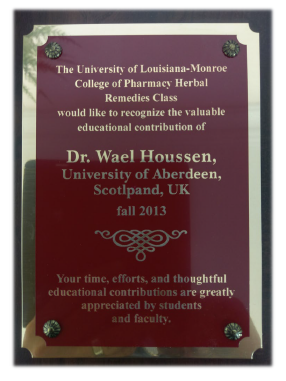
- Dr Houssen is an active Stem Ambassador. He organised several outreach activities with financial support from the Royal Society of Chemistry to inspire school children with chemistry, chemical biology and synthetic biology. (https://www.abdn.ac.uk/news/9310/?action=news_details&id=9310/) (https://www.abdn.ac.uk/news/10489/). (https://www.rsc.org/news-events/community/2020/jan/chembio-for-schools/)

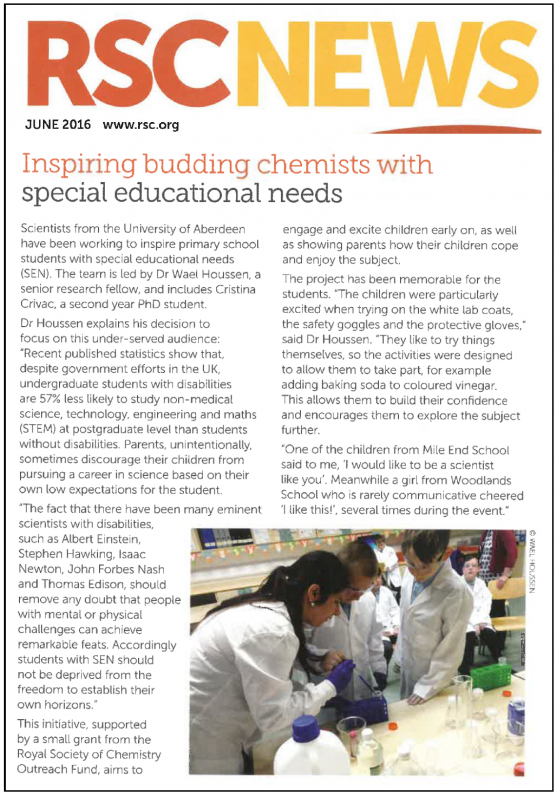
- Publications
-
Page 2 of 6 Results 11 to 20 of 53
Cyclic Peptides – A Look to the Future
Cyclic Peptides: From Bioorganic Synthesis to Applications. Koehnke, J., Naismith, J., van der Donk, W. A. (eds.). Royal Society of Chemistry (Great Britain), pp. 340-373, 34 pagesChapters in Books, Reports and Conference Proceedings: Chapters- [ONLINE] DOI: https://doi.org/10.1039/9781788010153-00340
Cyclic peptide production using a macrocyclase with enhanced substrate promiscuity and relaxed recognition determinants
Chemical Communications, vol. 53, no. 77, pp. 10656-10659Contributions to Journals: ArticlesA Blind Test of Computational Technique for Predicting the Likelihood of Peptide Sequences to Cyclize
The Journal of Physical Chemistry Letters, vol. 8, no. 10, pp. 2310-2315Contributions to Journals: ArticlesIsolation and anti-HIV-1 integrase activity of lentzeosides A-F from extremotolerant lentzea sp. H45, a strain isolated from a high-altitude Atacama Desert soil
The Journal of antibiotics, vol. 70, pp. 448-453Contributions to Journals: Articles- [ONLINE] DOI: https://doi.org/10.1038/ja.2016.78
- [OPEN ACCESS] http://aura.abdn.ac.uk/bitstream/2164/7915/1/Manuscript_JA_22453_Accepted.pdf
Accurate quantification of modified cyclic peptides without the need for authentic standards
Tetrahedron, vol. 72, no. 52, pp. 8603-8609Contributions to Journals: ArticlesStructure of the cyanobactin oxidase ThcOx from Cyanothece sp. PCC 7425, the first structure to be solved at Diamond Light Source beamline I23 by means of S-SAD
Acta Crystallographica Section D: Structural Biology, vol. 72, no. 11, pp. 1174-1180Contributions to Journals: Articles- [ONLINE] DOI: https://doi.org/10.1107/S2059798316015850
- [OPEN ACCESS] http://aura.abdn.ac.uk/bitstream/2164/7736/1/ag5003.pdf
Spongionella Secondary Metabolites, Promising Modulators of Immune Response through CD147 Receptor Modulation
Frontiers in Immunology, vol. 7, 452Contributions to Journals: Articles- [ONLINE] DOI: https://doi.org/10.3389/fimmu.2016.00452
- [OPEN ACCESS] http://aura.abdn.ac.uk/bitstream/2164/7735/1/fimmu_07_00452.pdf
Inside Cover: The Catalytic Mechanism of the Marine-Derived Macrocyclase PatGmac (Chem. Eur. J. 37/2016)
Chemistry : a European Journal, vol. 22, no. 37, pp. 12946Contributions to Journals: Articles- [ONLINE] DOI: https://doi.org/10.1002/chem.201603742
- [ONLINE] View publication in Scopus
The Catalytic Mechanism of the Marine-Derived Macrocyclase, PATGmac
Chemistry : a European Journal, vol. 22, no. 37, pp. 13089-13097Contributions to Journals: ArticlesIdentification of Spongionella compounds as cyclosporine A mimics
Pharmacological Research, vol. 107, pp. 407-414Contributions to Journals: Articles- [ONLINE] DOI: https://doi.org/10.1016/j.phrs.2016.03.029
- [OPEN ACCESS] http://aura.abdn.ac.uk/bitstream/2164/8589/1/Manuscript.doc
